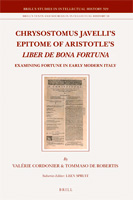Valérie Cordonier (CNRS, SPHere) and Tommaso De Robertis
“In this book, Valérie Cordonier and Tommaso De Robertis provide the first study, along with edition and translation, of Chrysostomus Javelli’s epitome of the Liber de bona fortuna (1531), the famous thirteenth-century Latin compilation of the chapters on fortune taken from Aristotle’s Magna Moralia and Eudemian Ethics. An Italian university professor and a prominent figure in the intellectual landscape of sixteenth-century Europe, Javelli (ca. 1470-ca. 1542) commented on nearly the entirety of Aristotle’s corpus. His epitome of the Liber de bona fortuna, the only known Renaissance reading produced on this work, offers an unparalleled insight into the early modern understanding of fortune, standing out as one of the most comprehensive witnesses to discussions on fate, fortune, and free will in the Western world.”
Table of contents
Acknowledgements
List of Figures
Introduction
1 The Liber de bona fortune : Its Origin and Early Diffusion
- 1 The Textual History of the Liber in the Context of the Rediscovery of Aristotle’s Ethical Works
- 2 Aquinas’s Innovative Reading of the Two Chapters Making up the Liber : Summa contra Gentiles III, 92
- 3 An Interpretive Matrix for Later Readings : Giles of Rome’s Sententia de bona fortuna and Its Critical Discussion by Henry of Ghent
2 Chrysostomus Javelli : His Life and Work as Commentator on Aristotle
- 1 Javelli’s Early Years, His Activity as Regens at the Studium of Bologna, and His Involvement in the “Pomponazzi Affair”
- 2 Javelli’s Later Appointments, His Inquisitorial Activity, and the Publication of His Oeuvre
- 3 The Reception of Javelli’s Works in Late Sixteenth-Century Europe : Some Particular Cases
3 The Content of Javelli’s Epitome of the Liber de bona fortune
- 1 The Presentation of the Liber as an Essential Complement to Aristotle’s Doctrine of the Ultimate Human Good (Prologue)
- 2 The Definition of Good Fortune as a Kind of Nature and the Different Concepts of “Nature” in Aristotle (Chapter 1)
- 3 The Different Concepts of “Fortune” in Aristotle and the Specificity of the Concept under Consideration in the Liber (Chapter 1)
- 4 “Suppose Socrates Wants to Rule” : On Fortune’s Own Jurisdiction (Chapter 2)
- 5 The Four Categories of Potentially “Well-Fortuned” Men : Medieval Tradition and Humanistic Sources (Chapter 3)
- 6 The Workings of Good Fortune and the Doctrine of God’s Uniform Action as a Key-Feature of Giles’s Doctrine (Chapter 4)
- 7 The Conditions for being Well-Fortuned, and the Dice Analogy as a Further Clue of Giles’s Influence (Chapter 4)
- 8 What Ancients Say about Good Fortune (Chapter 5)
- 9 Concluding Remarks
4 The Liber de bona fortuna in Javelli’s Other Works
- 1 The Liber in Javelli’s Sets of Quaestiones on Aristotle’s Natural Philosophy
- 2 The Liber in Javelli’s Original Writings
- 3 Javelli’s Epitomes of Aristotle’s Natural and Moral Philosophy
5 Javelli’s Epitome of the Liber de bona fortune, Its Two Versions and Its Editorial History
- 1 The Editorial History of Javelli’s Epitome and the Publication of the Two Versions of This Text in the Course of the Sixteenth Century
- 2 The Overall Structure and the Organization of the Chapters in the Two Versions of the Epitome
- 3 The Use and Quotation of Ancient and Medieval Sources in the Two Versions of the Epitome
6 Edition and Translation of Javelli’s Epitome of the Liber de bona fortune
- 1 Editorial Principles
- 2 Version A
- 3 Version B
Bibliography
Indices
: : Brill’s Studies in Intellectual History, Volume : 329/24
: : Series Brill’s Texts and Sources in Intellectual History, Volume : 329/24
: : viii, 256 p.
: : August 2021
: : DOI : https://doi.org/10.1163/9789004464797
: : isbn : 978-90-04-41615-4
: : isbn e-book : 978-90-04-46479-7
Dans la même rubrique :
- Averroès, Dieu et la connaissance du monde
- Écrits d’histoire et de philosophie des sciences
- Demain, la veille
- TECHNOCRATISME. LES GRANDS CORPS À LA DÉRIVE
- Epicureanism and Scientific Debates. Antiquity and Late Reception
- Géométrie et philosophie des mathématiques au Xe siècle - Œuvre mathématique d’al-Sijzī. Volume II
- Infini et Disproportion Chez Pascal
- L’Éclectisme dans la pensée philosophique et médicale des XVIIIe et XIXe siècles
- Savoirs profanes dans les ordres mendiants en Italie (XIIIe-XVe siècles)
- Le monde mathématique. Marco Trevisano et la philosophie dans la Venise du Trecento
- Indigenous Knowledge and Ethnomathematics
- Cultures of Computation and Quantification in the Ancient World.
- The Place of Archimedes in World History : Arguments and Counterarguments.
- Éthique et économie dans les philosophies anciennes
- Un regard sur les élites françaises : l’institut Auguste-Comte
- Concrete Numbers versus Abstract Numbers
- Companion to the Reception of Pythagoras and Pythagoreanism in the Middle Ages and the Renaissance
- De sex inconvenientibus. Traité anonyme de philosophie naturelle du XIVe siècle
- La (Re)construction française de l’analyse infinitésimale de Leibniz 1690-1706
- L’intellect. Compendium du livre De l’âme




